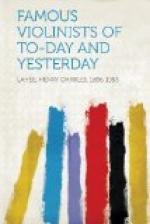He tried to secure a place in the orchestra of the Opera Comique, but his arrogance lost him the position, for when he was requested to play a piece at sight, it seemed to him so simple that he asked at which end he should begin. This offence caused him to be rejected without a hearing.
Fortune, however, began at last to smile upon him when he made the acquaintance of M. Lacour, a violin maker, who conceived the idea of engaging him to show off his violins. Ole Bull accordingly played on one of them at a soiree given by the Duke of Riario, Italian charge d’affaires in Paris. He was almost overcome by the smell of assafoetida which emanated from the varnish, and which was caused by the heat. Nevertheless, he played finely, and as a result was invited to breakfast the next morning by the Duke of Montebello, Marshal Ney’s son. This brought him into contact with Chopin, and shortly afterwards he gave his first concert under the duke’s patronage, and with the assistance of Ernst, Chopin, and other celebrated artists.
He now made a concert tour through Switzerland to Italy, and on reaching Milan he played at La Scala, where he made an immense popular success, but drew from one of the journals a scathing criticism, which, however humiliating it may have been, struck him by its truth.
“M. Bull played compositions by Spohr, Mayseder, and Paganini without understanding the true character of the music, which he marred by adding something of his own. It is quite obvious that what he adds comes from genuine and original talent, from his own musical individuality; but he is not master of himself; he has no style; he is an untrained musician. If he be a diamond, he is certainly in the rough and unpolished.”
Ole Bull sought out the writer of this criticism, who gave him valuable advice, and for six months he devoted himself to ardent study under the guidance of able masters. In this way he learned to know himself, the nature and limitations of his own talent.
We now arrive at the point in Ole Bull’s career at which he became celebrated, and this was due to accident. He was at Bologna, where De Beriot and Malibran were to appear at one of the Philharmonic concerts. By chance Malibran heard that De Beriot was to receive a smaller sum than that which had been agreed upon for her services, and in a moment of pique she sent word that she was unable to appear on account of indisposition. De Beriot also declared himself to be suffering from a sprained thumb.
It happened that Madame Colbran (Rossini’s first wife) had one day heard Ole Bull practising as she passed his window, and now she remembered the fact, and advised the Marquis Zampieri, who was the director of the concerts, to hunt up the young violinist. Accordingly, Ole Bull, who had gone to bed very early, was roused by a tap on the door, and invited to improvise on the spot for Zampieri. Bull was then hurried off, without even time to dress himself suitably for the occasion, and placed before a most distinguished audience, which contained the Duke of Tuscany and other celebrities, besides De Beriot, with his arm in a sling.




